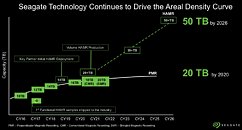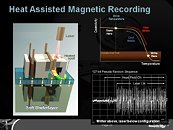Raevenlord
News Editor
- Joined
- Aug 12, 2016
- Messages
- 3,755 (1.19/day)
- Location
- Portugal
| System Name | The Ryzening |
|---|---|
| Processor | AMD Ryzen 9 5900X |
| Motherboard | MSI X570 MAG TOMAHAWK |
| Cooling | Lian Li Galahad 360mm AIO |
| Memory | 32 GB G.Skill Trident Z F4-3733 (4x 8 GB) |
| Video Card(s) | Gigabyte RTX 3070 Ti |
| Storage | Boot: Transcend MTE220S 2TB, Kintson A2000 1TB, Seagate Firewolf Pro 14 TB |
| Display(s) | Acer Nitro VG270UP (1440p 144 Hz IPS) |
| Case | Lian Li O11DX Dynamic White |
| Audio Device(s) | iFi Audio Zen DAC |
| Power Supply | Seasonic Focus+ 750 W |
| Mouse | Cooler Master Masterkeys Lite L |
| Keyboard | Cooler Master Masterkeys Lite L |
| Software | Windows 10 x64 |
Seagate announced its roadmap for the coming years, and the company is naturally fighting tooth and nail for the relevance of HDD technology in the market. While the benefits of SSDs are already well understood by the entire industry, in some scenarios, it makes more sense to make use of high-density HDDs - particularly where deployment space is at a premium, and in scenarios where seek times for information stored on the media aren't all that important. This is why the company is aggressively pushing its new HAMR technology as a way to increase areal density on traditional platter-based media.
Plans to achieve 18 TB and 20 TB density HDDs in the first semester of 2020 seem to be well within reason, considering the company has recently shipped 16 TB HDDs. These HDD solutions will still make use of older technologies such as CMR (Conventional Magnetic Recording), for the 18 TB drives) and SMR (Shingled Magnetic Recording) for their 20 TB 2020 products. The company will later make use of their proprietary HAMR (Heat Assisted Magnetic Recording) technology in order to upgrade their 20 TB, and 20 TB+ HDDs with higher performance (and density) than can be achieved with the tried and true SMR. When it comes to performance improvements, a latent disadvantage in HDDs compared to solid state solutions, the company will eventually deploy HDDs which make use of two sets of read/write heads instead of a single one.


View at TechPowerUp Main Site
Plans to achieve 18 TB and 20 TB density HDDs in the first semester of 2020 seem to be well within reason, considering the company has recently shipped 16 TB HDDs. These HDD solutions will still make use of older technologies such as CMR (Conventional Magnetic Recording), for the 18 TB drives) and SMR (Shingled Magnetic Recording) for their 20 TB 2020 products. The company will later make use of their proprietary HAMR (Heat Assisted Magnetic Recording) technology in order to upgrade their 20 TB, and 20 TB+ HDDs with higher performance (and density) than can be achieved with the tried and true SMR. When it comes to performance improvements, a latent disadvantage in HDDs compared to solid state solutions, the company will eventually deploy HDDs which make use of two sets of read/write heads instead of a single one.


View at TechPowerUp Main Site






